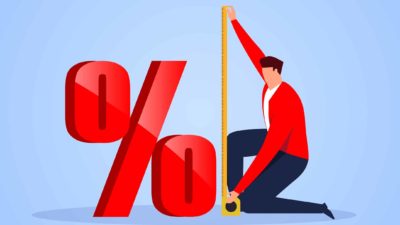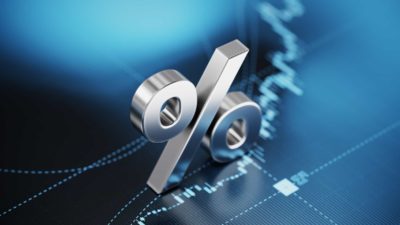The phrase "interest rates are at record lows" has become ingrained in our expectations over the past year or 2. The Reserve Bank of Australia (RBA) has been whittling interest rates ever lower for so long now that its hard to remember a time when the Bank was doing anything else.
Indeed, we have to go all the way back to November 2010 for the last time the RBA actually raised rates, more than a decade now. Back then, the RBA had just hiked the cash rate by 0.25% to 4.75% – a level that feels immeasurably high by today's standard. Even over the past year, we have seen a dramatic revision in the cash rate. This time last year, the cash rate was 0.75%. That's a very long way from the current rate of 0.1% when you think about it.
But we better get used to it.
RBA is keeping rates lower for longer
Last week, the RBA held its monthly meeting and (surprise, surprise) decided to keep the cash rate steady at 0.1%. But the RBA went a little further. It also named the conditions under which it would consider raising rates again. That boiled down to the following:
The board will not increase the cash rate until actual inflation is sustainably within the 2 to 3 per cent target range. For this to occur, wages growth will have to be materially higher than it is currently. This will require significant gains in employment and a return to a tight labour market. The board does not expect these conditions to be met until 2024 at the earliest.
That's a lot of hurdles for the economy to jump over – hence the 2024 indication.
So rates are pretty much guaranteed to remain at record lows for the next few years, if the RBA is to be believed. This is both a blessing and a curse.
A zero rate world: blessings and curses
It's a blessing for the economy and investors. Cheap credit that is permitted under such a low rate is normally good for economic growth. It means businesses that want to borrow to expand, or investors who want to borrow to leverage their assets can do so at the cheapest rates in history. That should be at least partly accommodating to higher economic growth. Further, low rates boost the valuations of growth assets like ASX shares and property. Since most investors ascertain the future value of a share by comparing it to a risk-free rate of return they can get from a government bond, the lower this risk-free rate, the more valuable the shares. And government bond yields are directly tied to interest rates.
But it's also a curse in many other ways. As retirees would know, safe cash investments like savings accounts and term deposits have never been more unproductive. Indeed, it's nigh impossible to get a real, inflation-beating rate of return from a term deposit (or a savings account) these days. That has the rather unpleasant side-effect of pushing investors who don't really want to be in the sharemarket, into the share market. These investors might be desperate for a real return, but concurrently terrified of losing their capital. Such skittishness is not a good thing to have in the markets.
Is cash trash?
Further, there have been many warnings about the near-zero interest rates causing bubbles of financial speculation. No one can deny we have seen some evidence of this in recent months. Events like the soaring share prices of companies like Afterpay Ltd (ASX: APT), Tesla Inc (NASDAQ: TSLA), and Nio Inc (NYSE: NIO) don't exactly have a conservative feel right now. The whole GameStop Corp (NYSE: GME) saga recently have only amplified these concerns.
So how does one treat cash under this new paradigm?
Well, I think a good start is jettisoning the notion that any cash-based investment is still an investment. A term deposit earning 1% per annum will not protect your principle from eroding under inflation. Recent data from the Australian Bureau of Statistics (ABS) tells us that the consumer price index (CPI), a standard measure of inflation, was running at 0.9% for the 12 months to the quarter ending 31 December 2020. That basically means if your cash wasn't earning at least 0.9% in interest, your purchasing power fell over those 12 months. Even if you managed to find a term deposit still paying 1% per annum, getting a real rate of return of 0.1% is not going to make anyone wealthy.
Thus, cash should be treated as a tool, rather than an investment in this Brave New World.
Safety vs. returns
So, for starters, make sure you keep enough on hand for your goals and needs. If you're saving up for a house, keep the faith and keep saving (even though you're getting no help from the bank). If you're building an emergency fund of 3-6 months worth of living expenses for a rainy day, stay the course.
But if you have tens of thousands of dollars sitting in cash that you could not conceivable find a use for in the next few years, it might be time to think about putting it to work in investments that actually give you a real rate of return. For example, a simple exchange-traded fund (ETF) that tracks the S&P/ASX 200 Index (ASX: XJO) has returned an average of around 10.03% per annum over the past 5 years. Even the current dividend yield of the index is currently at 1.94%. That's all looking pretty good against a term deposit right now.
One of the world's top investors – Ray Dalio – told us that 'cash is trash' a few months ago. Most assets, whether that be gold, property or ASX shares, have always outperformed cash as an investment over long periods of time, bubbles included. So have a think about how much cash you actually need to be safe in your needs and wants. If there's any left on top of that, it might be time to invest. Investing is never risk-free. But the biggest risk of all might be getting a guaranteed return of zero.









